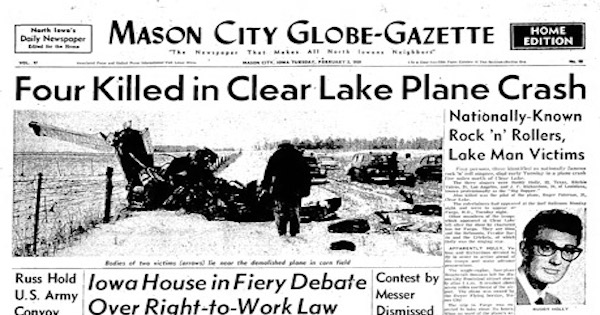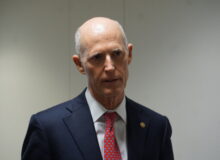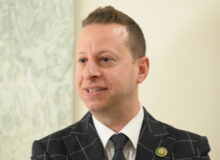Some accidents are burned into memory even decades after they happened, the assassination of JFK, the Challenger explosion, 9/11/01 are all those type of events. For those who were alive February 3, 1959, the event that day is singed in memory and will always be known as “The Day The Music Died.”
Killed in an airplane crash that night were rock and roll icons Buddy Holly, 22, of Lubbock, Tex.; Ritchie Valens, 17, of Los Angeles; J.P. (Big Bopper) Richardson, 24, of Beaumont, Tex., also killed was the pilot, Roger Peterson, 21, of Clear Lake, Iowa. Three of Rock and Roll’s most promising performers were gone. The three were together on a concert tour. Buddy Holly was fed up with the chartered bus with its faulty heater, so before the performance he asked the tour manager Carroll Anderson about renting a chartered plane to fly him to his next destination in Moorhead, Minnesota. Anderson knew the owner of Dwyer Flying Service in nearby Mason City whom he contacted to arrange the flight. Anderson was not able to get hold of the owner so he called one of the pilots, Roger Peterson, who agreed to take Buddy plus two others to Moorhead. But the plane never made it home.
Ever since that horrible plane crash, February 3 has been known as “the day the music died.”
“The Winter Dance Party Tour” was planned to cover 24 cities in a short 3-week time frame (January 23 – February 15), they were traveling by bus. But, the tour bus developed heating problems. It was so cold on board that reportedly one of the drummers developed frostbite riding in it. When they arrived at the Surf Ballroom in Clear Lake, Iowa, they were sick and tired of the cold bus. So Buddy Holly chartered a plane for himself and his guys, which turned out to be a tragic mistake. The press said the concert was magical as the fans went wild over the performers.

The plane took off a little after 1 A.M. from Clear Lake and never got far from the airport before it crashed, killing all onboard. According to reports, one wing hit the ground and the small plane corkscrewed over and over. The three young stars were thrown clear of the plane, leaving only pilot inside.
Ritchie Valens had just released “LA Bamba.” He was only 17 years old. Valens recently finished his first motion picture, “Go Johnny! Go.” His first recording six months ago, “Donna,” sold more than a million copies. Jimmy Page once said, “Valens was my first guitar hero and I played that bridge to ‘La Bamba’ a thousand times.”

Jiles Perry Richardson, age 28, AKA The Big Bopper had his start as a hilarious and energetic radio DJ and was famous for “Chantilly Lace” – the third most played radio song of 1958. The Big Bopper wasn’t supposed to be on the plane. He was sick with the flu so he asked Buddy Holly’s bassist if he would allow him to replace him the plane so he could rest and have time to see a doctor once they landed. That bassist became a superstar in his own right; Waylon Jennings. His life was saved because he agreed to help out a friend.
When Holly learned that Jennings wasn’t going to fly, he said, “Well, I hope your old bus freezes up.” Jennings responded, “Well, I hope your plane crashes.” This friendly banter of friends would haunt Jennings for years.
Buddy Holly, age 22 was not only one of the founding fathers of Rock N Roll, he was Rock’s first major superstar (and that after 18 months in the business). Decca Records originally told Holly he wasn’t quite good enough when they first signed him. They directed him to go back home to Texas and practice. He did and brought back the classic, “That’ll Be The Day’. Buddy Holly and the Crickets brought such classics as “Peggy Sue” to the world.

In 1988, Buddy Holly fan Ken Paquette built a monument to the singers, from stainless steel, and placed it at the crash site where the current owners of the land also planted four trees in memory of the victims.
The Winter Dance Party tour continued, with Waylon Jennings singing Holly’s songs and other teen sensations, including 18-year-old Frankie Avalon, flown out to finish the tour.
Thirteen years later Don McLean memorialized Holly, Valens and Richardson with the No. 1 hit “American Pie,” embedded below.
My friend Warner Todd Huston wrote a heartwarming story about how the son of the Big Bopper finally met his father 50 Years After The Day The Music Died, its a great story and an excellent read, I recommend you click here and read the post at his site, Publius Forum.






